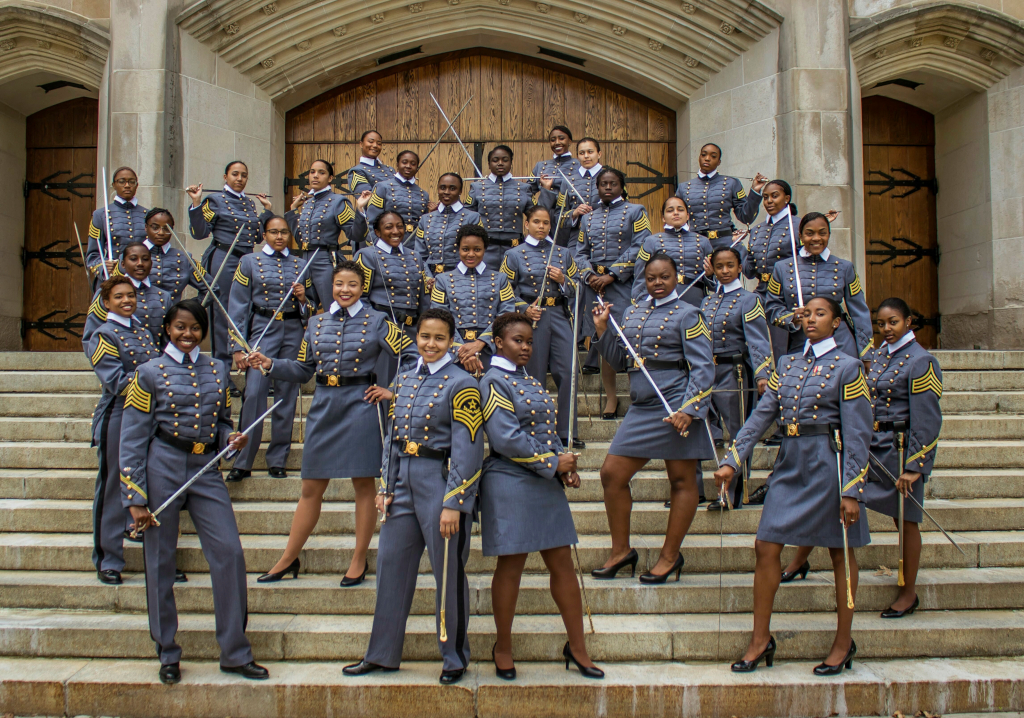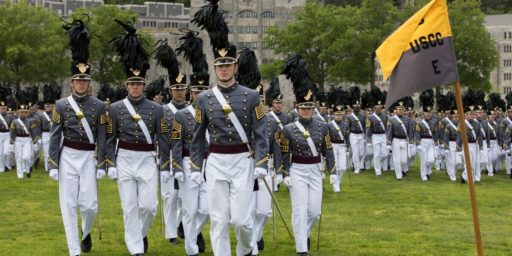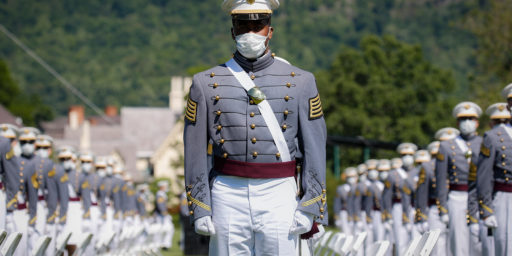West Point Graduates Record Number Of African-American Women
This year's graduating class at West Point includes a record number of African-American women.

Yesterday, the U.S. Military Academy at West Point held its 2019 graduation ceremony, with Vice-President Mike Pence standing in for President Trump to deliver the Commencement Address. The most notable thing about yesterday’s events, though, was the record number of black women graduating in what is reportedly the most diverse class in Academy history:
A record number of African American women graduated from West Point military academy in New York.
Among the more than 200 female cadets in the 2019 graduating class, 34 were black women, the largest number of African American female graduates in the academy’s history.
U.S. Military Academy spokesman Francis DeMaro said last year’s class had 27 African American female graduates.
Overall there were 110 African American graduates, double the number from six years ago, in 2013.
Tiffany Welch-Baker told NBC’s “Nightly News” this week that in her journey to graduating from the military academy, she sometimes doubted herself.
“There are some moments here where you feel like, ‘Oh, am I worthy? Do I deserve to be here?'” she said.
Bria Erron said there were times at the school when she was the only woman of color, or woman of any race, in a class. Even with the increase, black women made up less than 4% of this year’s graduating class.
A photo of the women dressed in uniform as they posed on the steps of the U.S. Military Academy went viral on social media last week, sparking a wave of congratulatory messages.
“Almost two years ago, West Point grad Simone Askew became the first Black woman leader of the Corps of Cadets. This month, West Point will graduate the largest class of Black women in their history. Don’t let anyone tell you representation doesn’t matter,” Sen. Cory Booker, D-N.J. tweeted.
“Congratulations on entering the next great chapter of your lives,” Sen. Kamala Harris, D-Calif. posted. “I know you are just getting started.”
Jabreal Arrington told “Nightly News” it was “overwhelming” to be a part of such a historic moment.
“To see all of our sisters, us just standing there in solidarity,” she said of the photo.
“My hope when young black girls see these photos is that they understand that regardless of what life presents you, you have the ability and fortitude to be a force to be reckoned with,” Welch-Baker told the outlet Because of Them We Can earlier this month.
The extent of diversity in this year’s graduating class is a sign of just how much the military in general, and West Point itself, have changed over the course of recent decades. It was just forty-four years ago, for example, that Congress authorized the admission of women to the service academies, and that was a decision that took a generation or longer for the institution, its graduates and students, and the Army to adjust.
Additionally, while service academy admissions had been accepting African-American cadets since 1870, it wasn’t until 1979 that the USMA had its first African-American to lead the Corps of Cadets. That leader, Vincent Brooks, eventually became the Commander of American and United Nations forces in South Korea as well as serving in other top command positions in the Army all the way up to the Iraq War. Ten years after that, the institution had its first female leader of the Corps of Cadets, but the controversy over the admission of women still existed at the time and continued for some time thereafter. The fact that we’ve reached the point where the student body has become diverse as it is today is a positive reflection on the Academy and on the Army, which seems to have handled the process. Something reflected in yesterday’s graduating class.
The significance of this cannot be underestimated. While not all of these graduates will go on to make the Army their career, many of them will and many of those graduates are likely to rise higher and higher in the ranks until they too achieve the heights that General Brooks did before he retired. This is something that the American military has become used to, of course, and to no small degree it has done desegregation better than society as a whole. However, as the face of military leadership becomes more diverse that will likely serve as an example for other sectors of society.
Congratulations to all the new 2nd Lieutenants and good luck with your future careers.





Go Army!
An early, one-off assignment was to write a quickie kid’s biography of Generals Colin Powell and Benjamin Davis Jr. Davis was the founder of the Tuskeegee airmen. He graduated from West Point despite having been completely ostracized. For his entire time at West Point, no other cadet spoke to him except when required to in the line of duty. So. . . progress!
Which makes this observation by Thomas Sowell more poignant as he relates stories of young Black men who wanted to learn to be pilots, but ruled out the US Armed Forces because they’d never let them be pilots.
“Social justice is an actual impediment to acquiring human capital”
—Thomas Sowell
For some reason, I’m sure not malevolent, our social justice “woke” education system ends up instilling despondency in its victims.
@JKB:
Gee, then I wonder why we’re commenting on a piece about black women in record numbers at West Point? Do they look despondent to you?
Now if the remainder of society would catch up with the military on race and social equity. The military isn’t all bread and roses on this, Blacks and other minorities face racism and discrimination, but the institution of the military is configured to be color blind and award merit, then provides the institutional checks to guard against slippage, which is a great improvement of the rest of society. Now they need to get up to speed on sexual harassment.
Congratulation to these cadets and their classmates.
@JKB: I have read that comment three times and cannot understand your point or your attempt to connect Sowell’s quote to a racial injustice. If the black men were prevented from being pilots solely for their race alone, then the social justice remedy (hell the just remedy social or not) would be to eliminate a race based exclusion.
@mattbernius: @michael reynolds:
I’m sorry, I thought you’d recognize a link. It is to the interview where Thomas Sowell explains himself better than I can. I did try to give you the sense of his story regarding those who don’t overcome their social justice abuse like these women at West Point have.
@JKB: Sowell has anecdotes of two people, who believe that they will never be able to be pilots because they are black, and then ignores the increased number of black pilots (more than 2… let’s say 6!) that more than offset this, even assuming that his anecdotes are true, and that the people involved are telling the truth about their own motivations.
Sowell is just wrong about the effects of social justice — at least in the majority of cases.
And Sowell himself points out that the people in his anecdotes are wrong, and that they are claiming they would be prevented from doing something that others just like them had already done.
And it’s weird because he’s blaming the social justice folks for highlighting the systemic racism more than he is blaming the systemic racism.
Did these kids really not join the Air Force to become pilots because they learned (through the efforts of social justice) of systemic racism that would hold them back, or did they just think it was hard and reached for whatever excuse they could find? They were somehow unaware of systemic racism before that?
You can’t cure stupid, but you can be on alert for confirmation bias. Sowell has a theory that social justice, by highlighting existing injustice, discourages people from action, and he found two kids who tell him he is right. And then you found Sowell.
Just because people reach the same conclusions you do, doesn’t mean that they are right, even if you are right.
@JKB:
Ok watched the section of the video you mentioned (I’m going to go back and watch the whole thing). Now I understand what you were attempting to write.
Two points, you left out a key detail of Sowell’s anecdote — that these young men he knows chose not to join because, according to him, they didn’t join because they didn’t believe that white people would allow them to be pilots. I wish he could have shared more to understand when these conversations took place. If they were in the 1950’s when Sowell was in the military, then that’s an entirely different situation than if they took place today. At the start of the 1950s there were only 25 black pilots (and the chances of becoming a pilot were still quite slim).
It’s also true that there was a period in US history where prior to WW2 its entirely correct to say that African Americans would be prevented from being pilots due to race.
However if you believe that the “social justice” is movement is exemplified by people not doing things because they believe white people won’t allow them (which is apparently Sowell’s view in that segment — again I have yet to watch the full clip) then it displays a fundamental lack of understanding of the social justice movement that prevents any productive conversation from taking place.
The awareness of the reality of racial discrimination discourages people and your solution is. . .? Gaslight black people and tell them there are no racists? Do you think black people don’t reads or watch TV? Or listen to the endless stories their families can tell them? Were black people advancing by leaps and bounds only to be suddenly stopped short by people telling them what they already knew? I wonder then why we’re seeing this very article? Or the many ‘firsts’ including the first black POTUS?
Duh?
@mattbernius: Part of the social justice movement is that injustice should be exposed, and there are doubtless a few people who will see that exposed injustice and say “I have to put up with that, well then fvck it, I just won’t bother.”
If this is representative of Sowell’s thoughts in general, then he is putting too much weight on that (and too much on the likelihood that those few people are going to stick with it once they hit some obstacle). You can’t fix what you can’t measure.
There was a point in the past when the injustices in society were proudly displayed and trumpeted too remind black folks to mind their place, and when there was no effort to fix them. He may be conflating the social justice movement with that, but you really have to twist things around to make that equivalence.
A quick skim of his Wikipedia page shows that he is opposed to affirmative action and any form of quotas, because he thinks it makes people question the accomplishments of those who do succeed.
Having worked in a mostly white male industry that has been slowly getting more diverse (software, for those curious), even without quotas or affirmative action, I can say that he is 100% right about that questioning, and about it hurting minority folks’ careers. “Diversity hires” are blamed for mediocre white men not getting recognized for their greatness all the time, and minority folks have to prove their competence over and over, have trouble getting promoted, etc.
For the record, at these companies, the most “favoritism” I have seen in the hiring process is in the resume sorting phase — who gets a chance to prove themselves in interviews, while white men were still the majority brought in for interviews.
I think it would be even worse without that recruiting outreach, and the excuses would just be different. I might be wrong.
Fun/sad anecdote: I was once praised by a manager for really paying attention in meetings, contributing and making sure that the best ideas were heard and demonstrating a lot of leadership. I explained that I had actually completely checked out, and was just routinely saying roughly “I think that brown person or woman or whatever had a point, could you elaborate” after they had been completely ignored, lending them my tall-white-male-ness. My boss was sad.
@Gustopher:
One of my very best friends is of Thai ancestry. He told me recently that when he was a kid he would sometimes cry himself to sleep, wishing against all possibility that he’d wake up white rather than Asian.
No doubt someone will question his accomplishments, or call him a “diversity hire,” but you know what? He’d get fed that shit anyway. Now at least there’s some measure taken to ameliorate America’s deep and longstanding structure of institutional racism.
You’d think a man as intelligent as Thomas Sowell would understand that, but he apparently wants to trade questions about accomplishment for not being allowed to accomplish anything at all (or only being allowed to if you’re the “right” kind of black man).
@Mikey: Again, if it wasn’t questioning their qualifications because they are a “diversity hire”, it would be something else, if they even got a foot in the door.
But it does create a backlash, and every major employer in my industry, even in the most liberal cities on Earth, with the most liberal corporate values, has a Trumpy clique complaining bitterly that they are being discriminated against. They end up as interviewers and on hiring committees, feeling aggrieved.
I’m basically sure that they would be bigots anyway even without programs to give underserved communities a chance to show their abilities, and that these programs are a net positive for minorities (and the companies). But, I have no data, and no idea of how to get that data. I’m open to the alternative, if someone brings good data.
(My solution would be to measure the bias of individuals on hiring committee and during interviews, and then fire the bigots… but that only works if you can get a large enough sample set)
Conversely, I don’t believe the claims that “diverse teams are stronger teams”. Any measured productivity gains are that they just don’t have anything to talk about, other than work. Team did not loose an hour talking about Game of Thrones.
There’s no feminine, black or transgender experience that will inform data layout. No one has ever said “as a person of color, I think data marshaling has to be transparent, because we have a whole different experience with law enforcement.”
This has caused heated discussions in our mandatory “diversity is a benefit to everyone” trainings. No one expects someone to argue back, “you had me at fairness, but the rest of this is bs — they’re working with small data sets, so the margin of error is high, and they aren’t controlling for alternate explanations.” I really should learn to shut up, but a bored Gus is a mischievous Gus…
Note: For customer facing things, you desperately need a broad set of people in product, and a diverse development team can help cover some weaknesses there, if they are listened to. For instance, women treat privacy very differently than men, and people of color differently still.
Ouchie! That must have left a mark!